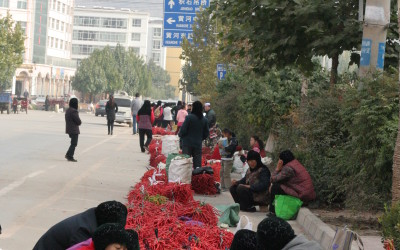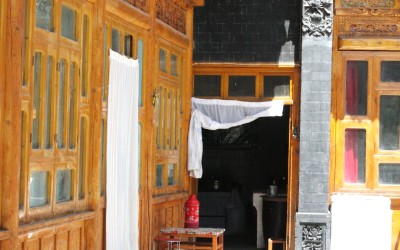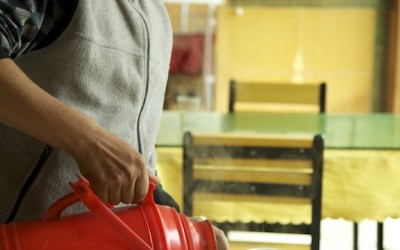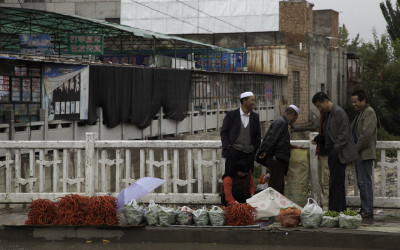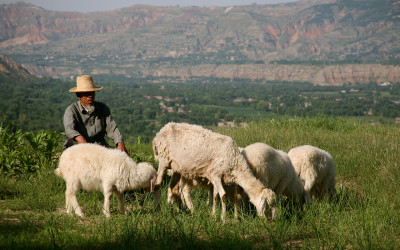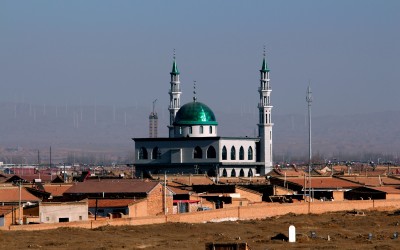The Salar
Continue steadfastly in prayer, being watchful in it with thanksgiving. At the same time, pray also for us, that God may open to us a door for the word, to declare the mystery of Christ, on account of which I am in prison—that I may make it clear, which is how I ought to speak.
Colossians 4:2-3
The Basics:
The Salar people migrated from the Samarkand region of Central Asia many centuries ago. According to oral tradition their forefathers bound a copy of the Koran to the head of a camel and followed it until it stopped at a waterfall and turned to stone in their present home of Qinghai province in Northwest China. Today two-thirds of the 120,000 Salar people still live in this small area of Xunhua County, Qinghai province, far away from the Uzbeks and Uighurs and other people groups with similar languages and cultures.
Their Beliefs:
Ninety Nine percent (99%) of the Salar people are Sunni Muslim and follow the five pillars of Islam: Witness, Prayer, Alms, Fasting, and Pilgrimage. They believe that there is no other God but Allah and hold dearly to the teachings set forth in the Koran by the prophet Muhammad. In the early 80’s there was in excess of 74 mosques in Xunhua County and that number would be considerably higher today. Life in each Salar community is centered around the local mosque and follows the instructions of the ahong, who is the religious leader and teacher in the mosque and community.
Their Language:
The Salar people have their own unwritten language. It is closely related to Uighur and Uzbek and typically spoken only in Salar homes and businesses. While the Salar language is unwritten, there is a growing movement to develop a written script and educate the younger generations so that their unique language and culture can be passed on. Approximately 80% of the Salar speak and understand the local dialect of Mandarin Chinese, while a significant percentage are able to speak Amdo Tibetan as a result of living and working among the Han Chinese and Tibetans for many years.
Their Livelihood:
The people are still predominantly agricultural focused, but many are also involved in the restaurant and transportation industries. Overall the economy in Xunhua has improved dramatically in the past decade, allowing many Salar to purchase homes and send their children to college for the first time. At the same time, there has been a renewed dedication to their Islamic beliefs and practice. Islam is no small part of their everyday lives.
The Situation:
Historically the Salar people have been labeled as troublemakers by the Chinese because of their involvement in numerous Muslim uprisings. They are a proud people – proud of this history, proud of their culture and language, and proud to be Muslims. In 1933 a young American family had a home in Xunhua County where they ministered to the Salar people. They opened a small chapel in the main Salar town and preached the Gospel, but with no success among the Muslim peoples – only the Chinese. In the 80-odd years since then, little has changed in the spiritual situation of the Salar people. While Chinese people are coming to Christ by the thousands, the Salar are still clinging to their Muslim heritage and beliefs, which are the only ones that they have ever known. But praise God that in the past few years the first few Salar people have come to faith in Christ Jesus and that more workers are coming to work in the harvest every month.
Typical Salar Jobs
The majority of the Salar people earn their living through agricultural means with horticulture as the sideline. Xunhua County is widely known as “the land of fruit” and each Salar family owns a limited amount of land that affords them an opportunity to grow apples, walnuts, and hot peppers.
Salar Living Conditions
Salar villages are traditionally comprised of a group of square, clay houses, which are each enclosed within a clay wall approximately three to four meters high. Intricately carved eaves, pillars and door frames, as well as flat roofs characterize these homes. In addition, fruit trees, flowers and vegetables are often planted inside the clay-walled courtyard.
Blinded by Tradition
As the sun sets behind the mountains, the crowded mini-bus jumbles along through a gorge that allows no margin for error by the driver, who is more cavalier about this dangerous terrain than his passengers. Jason begins to feel sick, but if he can just hang on through this gorge, he is almost home.
The Salar People
In 1933 a young American family had a home in Xunhua County of China where they ministered to the Salar people. They opened a small chapel in the main Salar town and preached the Gospel, but they saw no success among the Muslim peoples. In the decades since, little has changed in the spiritual condition of the Salar people.
He is risen! He is risen! He is risen indeed!
“Jesus did not die on the cross! Judas did!” Such was the emphatic statement of the father of new believer Abraham* as he rejected the notion that the great prophet Jesus could die such a gruesome death. Abraham’s parents have witnessed a distinct change in their son since he began following Jesus. The change appears to be good, but as they hear their son’s beliefs they cannot reconcile the incarnation and death of Jesus with their religious heritage, so they continue to reject the truth.
On God we have set our hope for Chinese Muslims, on God who raises the dead!
For over a century, followers of Jesus have planted their lives among Chinese Muslims and proclaimed the Gospel. Yet, today there are less than 1,000 followers of Jesus among the Hui, Salar and Dongxiang, and only a few small house churches. Praise God that today men and women and families from around the world (including Chinese believers) continue to intentionally live among Chinese Muslims and proclaim the Gospel. Praise God Chinese Muslims are hearing the Gospel and some are believing.
Prayer for the Salar
- For Chinese Christians to go and live and minister to the Salar while exhibiting an attitude of sacrifice and service.
- Pray that the prejudice and mistrust that hinders this from happening will be dissolved.
- For the first group of Salar Christians – that they would grow into mature disciples who are bold in their faith and committed to building the church.
- For the preparation of new tools and strategies to reach the Salar with the gospel.

